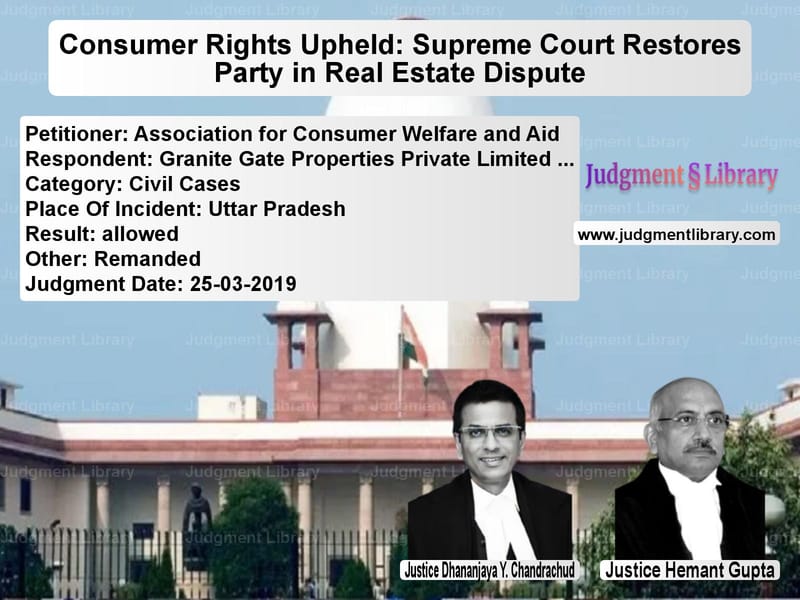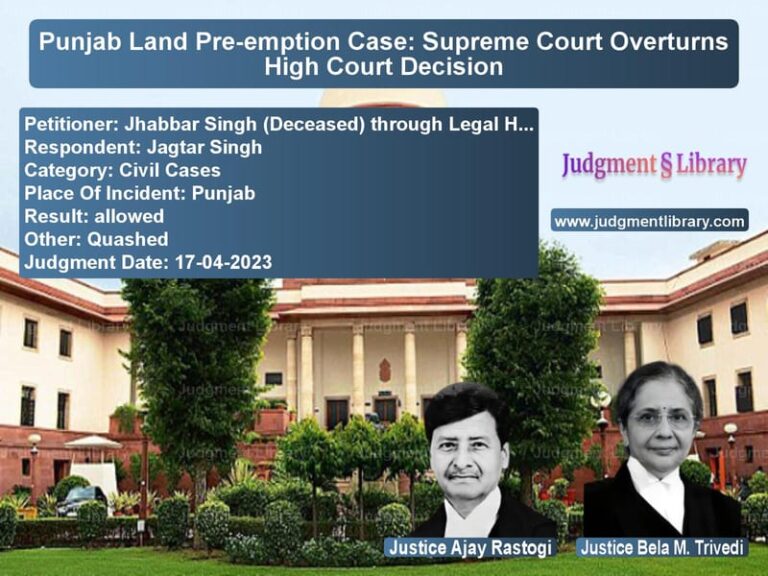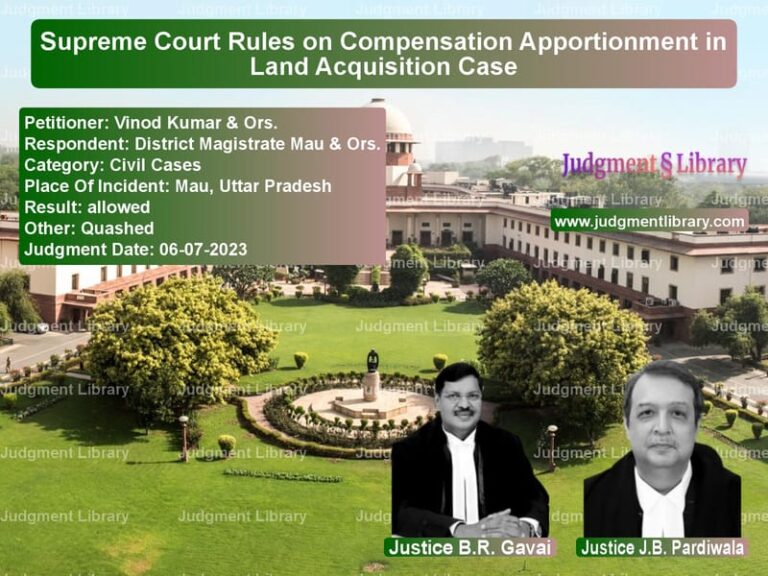Consumer Rights Upheld: Supreme Court Restores Party in Real Estate Dispute
The Supreme Court of India, in the case of Association for Consumer Welfare and Aid vs. Granite Gate Properties Private Limited & Anr., delivered a significant ruling concerning consumer rights in real estate disputes. The judgment set aside the National Consumer Disputes Redressal Commission’s (NCDRC) order that had deleted a key party from the proceedings in a consumer complaint related to delayed possession of flats. The ruling reinforces consumer protection laws and ensures that all responsible entities are held accountable in real estate transactions.
Background of the Case
The case stemmed from a complaint filed by the Association for Consumer Welfare and Aid, representing homebuyers of the ‘Lotus Panache’ real estate project. The project was promoted and developed by Three C Universal Developers Private Limited and Granite Gate Properties Private Limited. The complaint alleged the following issues:
- Delays in the handover of possession to homebuyers.
- Unjustified demands for additional payments based on alleged increases in the area of the flats.
- Failure to provide promised common amenities and facilities.
The consumer association sought relief from the NCDRC, requesting that both entities be held jointly responsible for delays and deficiencies in the project.
NCDRC’s Initial Decision
The NCDRC, in its order dated July 31, 2018, ruled that Three C Universal Developers Private Limited should be removed as a party in the proceedings, stating:
“The consumers on whose behalf this complaint is instituted did not hire or avail the services of opposite party No. 1 and therefore, they cannot be said to be its consumers.”
As a result, the complaint proceeded only against Granite Gate Properties Private Limited, the first respondent in the appeal.
Consumer Association’s Appeal to the Supreme Court
Aggrieved by the NCDRC’s decision, the consumer association approached the Supreme Court, arguing that:
- Three C Universal Developers Private Limited was integrally involved in the project.
- The company had promoted and marketed the project, positioning itself as the primary developer.
- The consumers had a direct relationship with the entity, making it liable for project delays and deficiencies.
- The deletion of the party weakened the case and denied justice to homebuyers.
Arguments by the Respondents
Granite Gate Properties Private Limited and Three C Universal Developers Private Limited defended the NCDRC’s decision, contending that:
- Granite Gate Properties Private Limited was the sole responsible entity under the Real Estate (Regulation and Development) Act, 2016.
- The agreement for the project was entered into only with Granite Gate Properties Private Limited, making Three C Universal Developers Private Limited an irrelevant party.
- The deletion of the latter was legally justified as it was not directly answerable to the homebuyers.
Supreme Court’s Observations
The Supreme Court thoroughly examined the nature of the two companies’ involvement in the project and the complaints raised by homebuyers. The key observations made by the Court included:
- The consumer complaints and evidence demonstrated that Three C Universal Developers Private Limited had actively marketed and promoted the project.
- Documents, including allotment letters, indicated that both companies had represented themselves under the brand name “The 3C Company.”
- Under Section 2(zk) of the Real Estate (Regulation and Development) Act, 2016, a promoter includes both entities that construct the building and those involved in selling the apartments.
- Removing Three C Universal Developers Private Limited at this stage would limit the consumers’ ability to seek complete justice.
The Court stated:
“On the basis of the material which is on record, it is not possible for the Court to conclude at the present stage that the second respondent is unconnected with the project or has been impleaded as a party to the proceeding without any reason or basis.”
Final Judgment
The Supreme Court allowed the appeal and set aside the NCDRC’s order, restoring Three C Universal Developers Private Limited as a party to the consumer complaint. The Court ruled that:
- The case should proceed before the NCDRC with both Granite Gate Properties Private Limited and Three C Universal Developers Private Limited as respondents.
- The homebuyers’ rights should be fully protected by ensuring that all responsible entities are held accountable.
- The question of liability would be determined at the final stage of the proceedings.
The judgment concluded:
“The complaint shall stand admitted against both the first and second respondents for final disposal.”
Conclusion
This Supreme Court ruling is a major win for consumer rights in the real estate sector. It ensures that homebuyers can hold all entities involved in a project accountable, even if they were not directly contracted. The judgment sets a crucial precedent that developers and promoters cannot escape liability by shifting responsibilities between corporate entities.
Petitioner Name: Association for Consumer Welfare and Aid.Respondent Name: Granite Gate Properties Private Limited & Anr..Judgment By: Justice Dhananjaya Y. Chandrachud, Justice Hemant Gupta.Place Of Incident: Uttar Pradesh.Judgment Date: 25-03-2019.
Don’t miss out on the full details! Download the complete judgment in PDF format below and gain valuable insights instantly!
Download Judgment: Association for Cons vs Granite Gate Propert Supreme Court of India Judgment Dated 25-03-2019.pdf
Direct Downlaod Judgment: Direct downlaod this Judgment
See all petitions in Consumer Rights
See all petitions in Property Disputes
See all petitions in Specific Performance
See all petitions in Judgment by Dhananjaya Y Chandrachud
See all petitions in Judgment by Hemant Gupta
See all petitions in allowed
See all petitions in Remanded
See all petitions in supreme court of India judgments March 2019
See all petitions in 2019 judgments
See all posts in Civil Cases Category
See all allowed petitions in Civil Cases Category
See all Dismissed petitions in Civil Cases Category
See all partially allowed petitions in Civil Cases Category







